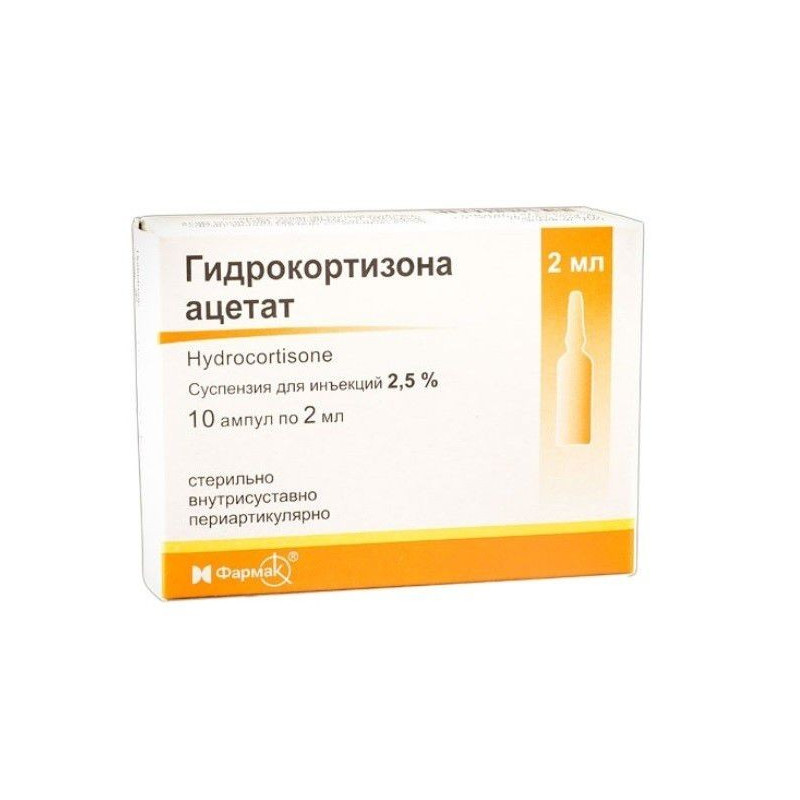



 All payments are encrypted via SSL
All payments are encrypted via SSL
 Full Refund if you haven't received your order
Full Refund if you haven't received your order
Suspension for injection
10 ampoules of 2 ml.
Hydrocortisone has anti-inflammatory, desensitizing (preventing or inhibiting allergic reactions) and antiallergic effect, has immunosuppressive (suppressive body defenses) activity.
GKS. Suppresses the function of leukocytes and tissue macrophages. Limits the migration of leukocytes to the area of inflammation. Violates the ability of macrophages to phagocytosis, as well as the formation of interleukin-1. It contributes to the stabilization of lysosomal membranes, thereby reducing the concentration of proteolytic enzymes in the area of inflammation. Reduces capillary permeability due to histamine release. Suppresses the activity of fibroblasts and the formation of collagen.
Inhibits the activity of phospholipase A2, which leads to the suppression of the synthesis of prostaglandins and leukotrienes. Suppresses the release of COX (mainly COX-2), which also helps to reduce the production of prostaglandins.
Reduces the number of circulating lymphocytes (T-and B-cells), monocytes, eosinophils and basophils due to their movement from the vascular bed to the lymphoid tissue; inhibits the formation of antibodies.
Hydrocortisone inhibits the release of ACTH and β-lipotropin by the pituitary gland, but does not reduce the level of circulating β-endorphin. It inhibits the secretion of TSH and FSH.
With the direct application of the vessels has a vasoconstrictor effect.
Hydrocortisone has a pronounced dose-dependent effect on the metabolism of carbohydrates, proteins and fats. Stimulates gluconeogenesis, promotes the uptake of amino acids by the liver and kidneys and increases the activity of gluconeogenesis enzymes. In the liver, hydrocortisone enhances the deposition of glycogen, stimulating the activity of glycogen synthetase and the synthesis of glucose from the products of protein metabolism. An increase in blood glucose activates insulin secretion.
Hydrocortisone inhibits glucose uptake by fat cells, which leads to activation of lipolysis. However, due to an increase in insulin secretion, lipogenesis is stimulated, which leads to fat accumulation.
It has a catabolic effect in the lymphoid and connective tissue, muscles, adipose tissue, skin, bone tissue. To a lesser extent than mineralocorticoids, it affects the processes of water and electrolyte metabolism: it promotes the excretion of potassium and Calcium ions, and the delay in the body of sodium and water ions. Osteoporosis and Itsenko-Cushing syndrome are the main factors limiting long-term therapy of corticosteroids. As a result of the catabolic effect, growth can be suppressed in children.
In high doses, hydrocortisone can increase the excitability of the brain tissue and contributes to lowering the threshold of convulsivereadiness. Stimulates excessive production of hydrochloric acid and pepsin in the stomach, which contributes to the development of peptic ulcers.
With systemic use, the therapeutic activity of hydrocortisone is due to the anti-inflammatory, antiallergic, immunosuppressive and antiproliferative effects.
When applied topically and locally, the therapeutic activity of hydrocortisone is due to the anti-inflammatory, antiallergic, and anti-exudative (due to the vasoconstrictor effect) action.
In anti-inflammatory activity 4 times weaker than prednisolone, in mineralocorticoid activity superior to other GCS.
Binding to plasma proteins - 40-90%. Metabolized mainly in the liver. T1/2 - 80-120 minutes Excreted by the kidneys mainly in the form of metabolites.
Allergic skin diseases, inflammatory diseases of the joints, rheumatism, arthritis, bursitis, bronchial asthma, acute adrenal insufficiency, thyroiditis, thyrotoxic crisis.
Severe diabetes mellitus, hypertension, circulatory failure III degree, Cushing's disease, psychoses, nephritis, osteoporosis, gastric ulcer and duodenal ulcer, syphilis, an active form of tuberculosis.
With prolonged use, potassium preparations should be prescribed to prevent hypokalemia.It is necessary to monitor blood pressure, blood sugar, potassium in the blood, blood clotting, diuresis, and patient weight. During treatment with hydrocortisone, vaccination is not recommended. To prevent the development of secondary hypocorticism caused by the cancellation of treatment, the dose should be reduced gradually. Treatment with hydrocortisone may mask some manifestations of the infection process, the addition of new infections.
1 ml of suspension contains:
Active substance: hydrocortisone acetate 25 mg;
Excipients: propylene glycol - 0.2 ml; sorbitol - 20 mg; Povidone - 10 mg; sodium chloride - 1.4 mg; benzyl alcohol - 0,015 ml; water for injection - up to 1 ml.
Intramuscularly (deep) in the gluteus muscle in a dose of 50-300 mg up to 1000-1500 mg / day. Before use, the contents of the vials should be shaken until a homogeneous suspension is formed.
In acute, life-threatening conditions, they are administered 100–150 mg every 4 hours for 48 hours; then, every 8–12 hours. For children, every 4 hours, 1-2 mg / kg, the optimal daily dose is 6–9 mg / kg.
In the cavity of the joints administered 5–25 mg (0.1–1 ml (depending on the size of the joint) 1 time per week. 3-5 injections per course. The effect of the drug begins 6–25 hours after the injection and lasts several days or weeks.
Virilization, obesity, hirsutism, menstrual disorders, osteoporosis, mental disorders, Itsenko-Cushing's symptom complex.
The effect is weakened by barbiturates, diuretics enhance hypokalemia.Reduces the effect of hypoglycemic agents.
Excess doses or prolonged administration of the drug can lead to inhibition of own production of glucocorticoids, increased blood pressure, ulcerative bleeding of the gastrointestinal tract, exacerbation of chronic infections, and the development of Itsenko-Cushing snide.
Treatment: symptomatic.
Store in a cool, dark place at a temperature not higher than + 18 ° C. Freezing is not allowed.
